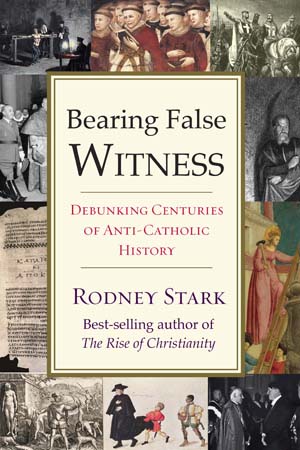Book reviews
 |
 |
 |
 |
 |
 |
 |
An Antidote against Our Poisonous Education
Book review of
Bearing False Witness Debunking Centuries of Anti-Catholic History by Rodney Stark, PA: West Conshohocken,Templeton Press, 2016, 268 pp.
Bearing False Witness is a work dedicated to refuting the most popular myths spread about the Catholic Church. The author, Rodney Stark, is a professor of religious social sciences at Baylor University and the author of numerous books.
Occupying the curious position of a non-Catholic defender of the Church, Stark argues that his work is “in defense of history.” His arguments, amply demonstrated with concise logic and reliable sources, utterly refute the slanders that are still being propagated about the Church to this day.
This work stands to destroy the anti-Catholic prejudices that have so tainted the American mind for what they really are, sad slanders devised by bitter and petty enemies of Church.
I must point out that at times the non-Catholic perspective of the author becomes apparent. His favorable comments on Vatican II detract from the overall objective character of the book. He adopts several syncretistic perspectives on paganism that are similarly distasteful. Despite these shortcomings, I believe the book is good in that it destroys a considerable number of lies about the Church’s past. Readers will be led to question the myths that are being taught in our earliest history courses. The following topics are but a sample of the myths refuted by this engaging read.
‘Sins of anti-Semitism’
After World War II, the Catholic Church is often accused of anti-Semitism, smeared by those who would like to paint her as a Jew-hating tyrant. Stark defends the Church against this alleged anti-Semitism by pointing to the fact that discrimination against the Jews far pre-dates the time of Our Lord.
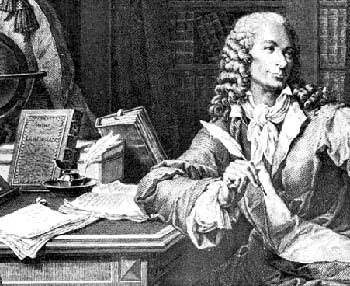 Cicero described them as “at variance with the glory of our Empire” and many other Roman authors described them in even worse terms. Additionally, it was Jews who persecuted early Christians as if they were a heretical sect. Peter Schafer, director of Judaic studies at Princeton, is even quoted to show that the early Jews condemn Our Lord and His followers as heretics, boldly claiming credit for His death.
Cicero described them as “at variance with the glory of our Empire” and many other Roman authors described them in even worse terms. Additionally, it was Jews who persecuted early Christians as if they were a heretical sect. Peter Schafer, director of Judaic studies at Princeton, is even quoted to show that the early Jews condemn Our Lord and His followers as heretics, boldly claiming credit for His death.
In truth the Church has consistently intervened as the protector of the Jews, Stark demonstrates. Throughout history mobs would assemble to attack Jews, and it was the priests and Bishops who risked their lives to stop the violence. More recently, Pope Pius XII did not support Hitler. This myth was spread by the Soviets to try and damage Church authority.
Imposing the ‘Dark Ages’
One of the most execrable myths regarding the medieval era is that they comprised the “Dark Ages.” Contrary to this widespread falsehood, Stark details that the Middle Ages was an era of unprecedented advancement and technological innovations on a scale unknown to any prior civilization.
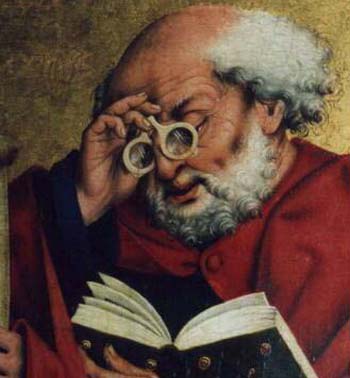 Medieval Europe saw the invention of wind power, crop rotation, drainage of the low countries, the heavy plow, chimneys, polyphony chant, musical notation, oil paintings and even eyeglasses. Militarily, it saw the rise of saddles and stirrups that allowed for heavy cavalry to smash the Saracens at the Battle of Tours.
Medieval Europe saw the invention of wind power, crop rotation, drainage of the low countries, the heavy plow, chimneys, polyphony chant, musical notation, oil paintings and even eyeglasses. Militarily, it saw the rise of saddles and stirrups that allowed for heavy cavalry to smash the Saracens at the Battle of Tours.
The Middle Ages also saw the first true sail ships as well as the first real cannons. Flying buttresses, also an innovation of the “Dark Ages,” meant that for the first time in human history massive stone structures could be built with walls as thin as glass and rich lattice work. Medieval architecture stands as a testament to the ingenuity of man.
It was not until the “prestigious” bigots of the “enlightened” era invented the term “Dark Ages” that this name began to spread. Men like Voltaire and Gibbons, eager to cast themselves as the vanguard of an enlightened age, used and disseminated this term to slander the medieval predecessors of Europe.
Crusading for land loot & converts
The myth that the Crusades ushered in an unprovoked wave of greed and brutality is so pervasive as to lead many in our times to apologize to Islam, but the history is quite different. First, the Crusades were not unprovoked; pilgrims were being tortured and Holy Places destroyed by the Muslims in power.
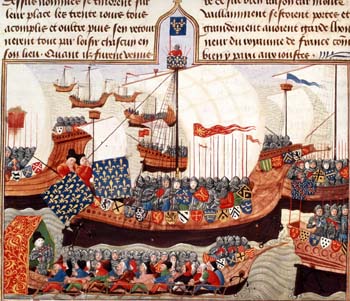 It was, again, the writers of the “Enlightenment” who spread the myth that the Crusaders were concerned about primarily loot and wealth. In reality ,embarking on the Crusades most often led to such great personal expense that the crusaders willingly bankrupted themselves to fund their campaigns. Sacked wealth did not offset the tremendous costs and, after their conquests, most returned to their homes.
It was, again, the writers of the “Enlightenment” who spread the myth that the Crusaders were concerned about primarily loot and wealth. In reality ,embarking on the Crusades most often led to such great personal expense that the crusaders willingly bankrupted themselves to fund their campaigns. Sacked wealth did not offset the tremendous costs and, after their conquests, most returned to their homes.
The crusader kingdoms themselves were not profitable, only surviving on European subsidies. It was for love of God, not riches, that the militant Catholics of Europe set out on the perilous adventure of the Crusades.
Finally, the Crusades were not barbaric. It is bad history to trust in the fabrications of the anti-Catholic “Enlightenment” thinkers as well as to judge the Crusades by the standards of modern warfare. While it is true that the crusaders sacked some of the cities in the Holy Lands, it must be remembered that this was common practice on both sides of the conflict, as well as throughout the rest of the world. Saladin spared Jerusalem as an exception to his record of slaughter, and the Egyptian sultan Baybars has the distinction of inflicting the greatest massacres in that period in history. Stark notes the curiosity that Western history texts are so silent on the subject of crusading era Muslim atrocities.
Stark’s defense of the Crusades is a necessary antidote for the apologetic spirit of our times. The Crusades were on the whole pious, selfless and justified, not unprovoked, barbarous or imperialist. No apology is needed.
Protestant Modernity
The myth that Protestantism heralded the Modern Era is also a myth. The economic idea forwarded by Max Weber that Capitalism required the freedom of Protestantism to develop is verifiably false.
It was the medieval monasteries of Europe that accumulated wealth, developed investment and capital planning, some becoming the proto-bankers of the cash economy. The Benedictines especially ennobled work, predating the “Protestant work ethic” by centuries, but without the Scrooge-like frugality and bitterness the latter comports.
Conclusion
It is beyond the scope of this book review to lay out the extent of the author’s arguments in detail. The lies about the Church are too numerous, and the refutations substantial and documented. Throughout, the work supports its arguments with adequate citations.
This book provides a strong case that will offer substantial defenses to the Catholic and provoke thought, it is hoped, in non-Catholics. Stark’s arguments successfully refute the slanders that have been hurled against Holy Mother Church and redeem the Medieval Age for the shining era it truly was.
Whether one is a Catholic seeking the knowledge to right these injustices, or a non-Catholic who simply wishes to free himself from some of the lies perpetuated by our education system, this work is an excellent credit to the field of History. I would recommend it to anybody who seeks to rise above the bigotry that has inundated Church and Medieval European history.

Occupying the curious position of a non-Catholic defender of the Church, Stark argues that his work is “in defense of history.” His arguments, amply demonstrated with concise logic and reliable sources, utterly refute the slanders that are still being propagated about the Church to this day.
This work stands to destroy the anti-Catholic prejudices that have so tainted the American mind for what they really are, sad slanders devised by bitter and petty enemies of Church.
I must point out that at times the non-Catholic perspective of the author becomes apparent. His favorable comments on Vatican II detract from the overall objective character of the book. He adopts several syncretistic perspectives on paganism that are similarly distasteful. Despite these shortcomings, I believe the book is good in that it destroys a considerable number of lies about the Church’s past. Readers will be led to question the myths that are being taught in our earliest history courses. The following topics are but a sample of the myths refuted by this engaging read.
‘Sins of anti-Semitism’
After World War II, the Catholic Church is often accused of anti-Semitism, smeared by those who would like to paint her as a Jew-hating tyrant. Stark defends the Church against this alleged anti-Semitism by pointing to the fact that discrimination against the Jews far pre-dates the time of Our Lord.

Voltaire wrote profusely against everything Catholic
In truth the Church has consistently intervened as the protector of the Jews, Stark demonstrates. Throughout history mobs would assemble to attack Jews, and it was the priests and Bishops who risked their lives to stop the violence. More recently, Pope Pius XII did not support Hitler. This myth was spread by the Soviets to try and damage Church authority.
Imposing the ‘Dark Ages’
One of the most execrable myths regarding the medieval era is that they comprised the “Dark Ages.” Contrary to this widespread falsehood, Stark details that the Middle Ages was an era of unprecedented advancement and technological innovations on a scale unknown to any prior civilization.

Eyeglasses, another invention of the medieval age
The Middle Ages also saw the first true sail ships as well as the first real cannons. Flying buttresses, also an innovation of the “Dark Ages,” meant that for the first time in human history massive stone structures could be built with walls as thin as glass and rich lattice work. Medieval architecture stands as a testament to the ingenuity of man.
It was not until the “prestigious” bigots of the “enlightened” era invented the term “Dark Ages” that this name began to spread. Men like Voltaire and Gibbons, eager to cast themselves as the vanguard of an enlightened age, used and disseminated this term to slander the medieval predecessors of Europe.
Crusading for land loot & converts
The myth that the Crusades ushered in an unprovoked wave of greed and brutality is so pervasive as to lead many in our times to apologize to Islam, but the history is quite different. First, the Crusades were not unprovoked; pilgrims were being tortured and Holy Places destroyed by the Muslims in power.

The desire to defend the Holy Land motivated the Crusaders to leave their homes & families
The crusader kingdoms themselves were not profitable, only surviving on European subsidies. It was for love of God, not riches, that the militant Catholics of Europe set out on the perilous adventure of the Crusades.
Finally, the Crusades were not barbaric. It is bad history to trust in the fabrications of the anti-Catholic “Enlightenment” thinkers as well as to judge the Crusades by the standards of modern warfare. While it is true that the crusaders sacked some of the cities in the Holy Lands, it must be remembered that this was common practice on both sides of the conflict, as well as throughout the rest of the world. Saladin spared Jerusalem as an exception to his record of slaughter, and the Egyptian sultan Baybars has the distinction of inflicting the greatest massacres in that period in history. Stark notes the curiosity that Western history texts are so silent on the subject of crusading era Muslim atrocities.
Stark’s defense of the Crusades is a necessary antidote for the apologetic spirit of our times. The Crusades were on the whole pious, selfless and justified, not unprovoked, barbarous or imperialist. No apology is needed.
Protestant Modernity
The myth that Protestantism heralded the Modern Era is also a myth. The economic idea forwarded by Max Weber that Capitalism required the freedom of Protestantism to develop is verifiably false.
It was the medieval monasteries of Europe that accumulated wealth, developed investment and capital planning, some becoming the proto-bankers of the cash economy. The Benedictines especially ennobled work, predating the “Protestant work ethic” by centuries, but without the Scrooge-like frugality and bitterness the latter comports.
Conclusion
It is beyond the scope of this book review to lay out the extent of the author’s arguments in detail. The lies about the Church are too numerous, and the refutations substantial and documented. Throughout, the work supports its arguments with adequate citations.
This book provides a strong case that will offer substantial defenses to the Catholic and provoke thought, it is hoped, in non-Catholics. Stark’s arguments successfully refute the slanders that have been hurled against Holy Mother Church and redeem the Medieval Age for the shining era it truly was.
Whether one is a Catholic seeking the knowledge to right these injustices, or a non-Catholic who simply wishes to free himself from some of the lies perpetuated by our education system, this work is an excellent credit to the field of History. I would recommend it to anybody who seeks to rise above the bigotry that has inundated Church and Medieval European history.

Posted August 4, 2016
______________________
______________________
 Volume I |
 Volume II |
 Volume III |
 Volume IV |
 Volume V |
 Volume VI |
 Volume VII |
 Volume VIII |
 Volume IX |
 Volume XI |
 Special Edition |
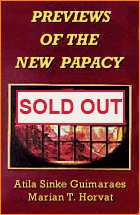 Special Edition |
